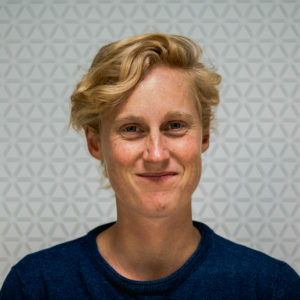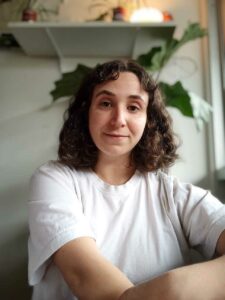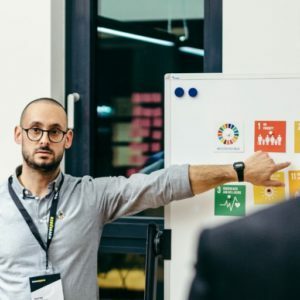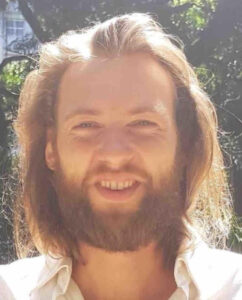Online Course
Sustainability by Design
Learn how to use systems thinking and a design mindset to create more sustainable projects and ideas, and apply sustainable principles within your professional work.
Course overview
The UN Global Goals for Sustainable Development were developed by the United Nations as “the blueprint to achieve a better and more sustainable future for all” (un.org). They address the global challenges we face, including those related to poverty, inequality, climate change, environmental degradation, peace, and justice. But how can we use these goals in our own work, and how do we move from big global goals to concrete local action? After this course, you will know how to work with the SDGs in a hands-on way. After a short introduction to the SDGs, we will take you through the process of creating a local challenge related to one of the global goals. Using sustainable design principles to create and redesign a solution to your challenge, you will create a new perspective on working with and for the SDGs.
Format of the course
SESSION 1
In this session you will learn about the concept of sustainable development; what is it and how did it develop over the years? We will take you through various perspectives on sustainable development and its critiques. What are the challenges, as well as opportunities when we work with the Sustainable Development Goals?SESSION 2
We will take the SDGs as a system, and see how the different goals interrelate. You will explore your own position towards the SDGs, personally as well as professionally, and learn about different ways how to approach all 17 SDGs as a system.SESSION 3
This module is about effectively framing the situation you are designing for. We do this by using the SDGs, as well as the framework of Doughnut Economics. How do you make sure you are working on something that contributes to a safe and just space for society while staying within the planetary boundaries of our ecosystem? How do we get from a global goal to a local challenge? How do we create ideas that are sustainable for people, the planet and prosperity?SESSION 4
Time to move from challenges to ideas! In this module, we will share a set sustainable principles that can help you enhance your idea – inspired by how real companies do this.SESSION 5
Now that you have moved towards creating ideas and a new solution, it is time to check back on how sustainable your idea actually is. Focusing on impact, you will assess where and how your solution is contributing to the SDGs (positively and negatively), and where there are potential gaps or trade-offs. You will further work out your idea via a Triple Value Proposition and a first version of its Sustainable Business Model.
Learning Outcomes
After successful completion of the course, participants should be able to understand:
- How the SDGs came into being and where we are now;
- Share various best practices of how the design community is approaching global and local challenges within the framework of sustainability;
- Through the use of hands-on methods, how to transform a global goal into a local challenge;
- How to map out your own local community or city within the limits of society and the planet;
- How to generate ideas and design for opportunities using creative brainstorm methods;
- Get a clear overview of what is going well, and what could be improved on the level of sustainability in the context you are working or living in;
- How to re-design your initial ideas for new initiatives that are sustainable by design, from the start, by asking examples from existing organisations and businesses.
Certification
A certificate of completion issued by Digital Society School (Amsterdam University of Applied Sciences) will be sent to successful participants. Successful completion can be achieved by attending all modules of the course.
For whom is this course?
- This course is for professionals who wants to know how to apply the Sustainable Development Goals in their own professional context.
- You might be aware of all 17 goals, but you are not entirely sure how to translate them into local tangible action.
- You want to apply your knowledge of sustainability in a practical way; and you want to get inspired by different ways of approaching a challenge, making sure that both your question and solution is rooted in sustainability.
- You are curious how design can be done (more) sustainably, and how you can move beyond design (thinking) to systemic design.
- You want to enrich your own professional practice by learning how sustainability can inform creativity (and the other way around).
Questions you may have
Covered Digital Society School competencies
- Sustainable Mindset
- Adaptive Learning
- Interdisciplinary Systems Thinking
Testimonial
I found the course Sustainability by Design empowering and also very useful. There are a lot of new concepts, tools, and practices I have learned during the three days of the course.
Meet the course instructors

Anneke van Woerden
is an experienced trainer and facilitator working on the intersection between design, social innovation, and sustainable development. Responsible for translating the produced research and knowledge of the Design Across Cultures track into hands-on tools, methods, and trainings. Since 2017, Anneke has been coordinating the Global Goals Jam, an international community of design activists, designing for and with the Sustainable Development Goals.

Irene Apena Abellan
is a programme co-ordinator at the Digital Society School, where she designs experiential learning experiences such as workshops, integrating social innovation, human capabilities and applied transformation. With a background in anthropology and philosophy, she aligns educational strategy with insights from cultural theory. At the core of her work, she translates critical theory into a practical set of skills by focusing on positionality and centering the learner’s experience.

Nadim Choucair
is an ecosystem builder and founder of Berlin-based 2030 Cabinet. He has worked at the intersection of the public and private sector to enable innovation in Canada and in Europe, published about entrepreneurship policy in Lebanon, and lately spent two years as a consultant at etventure, an EY company. He’s active on European Commission funded projects with the EU Green Deal and a focus on sustainable cities and sustainable food systems. 2030 Cabinet is on a mission to accelerate progress towards the 2030 Agenda through partnerships and systemic interventions though its cycle of LEARN CONNECT ENGAGE, providing workshops, trainings, consulting services and innovation scouting, as well as being responsible for running the Global Goals Berlin community.

Thomas van der Molen
is an experienced sustainability consultant, trainer, facilitator, and project manager. He holds a BBA in International Business and an MSc in Strategic Leadership towards Sustainability, Based on his thesis research Thomas developed the Sustainable Business Model Canvas Methodology and founded the SBM Academy, through which he helps startups and small businesses integrate sustainability at the core of their business model. Overall, he has worked on various strategic sustainability and innovation projects in a variety of sectors, and besides his entrepreneurial activities currently works for a Rotterdam-based sustainability consultancy.



